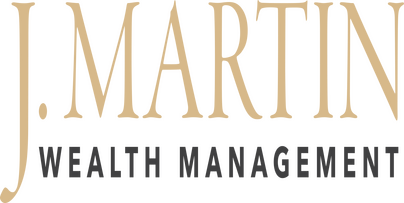Weekly Market Analysis | Howard Capital Management
Tailored Investment Solutions from Howard Capital Management and J. Martin Wealth
Located in Roswell, Georgia, Howard Capital Management (HCM) is an SEC-Registered Investment Advisor Firm. They aim to deliver professional money management solutions to individuals seeking growth while maintaining a prudent investment approach. The firm offers the use of the HCM-BuyLine®, developed by Vance Howard, CEO and Portfolio Manager at Howard Capital Management Inc., which has been their cornerstone since 1996. This stop-loss safeguard is crafted to provide timely guidance during market volatility. The HCM-BuyLine® effectively reduces downside risk by moving from equities to cash and cash equivalents while actively identifying opportunities to boost equity exposure during a market upswing.
J. Martin Wealth, based in Arizona, provides fiduciary financial advice tailored to help you meet your financial goals. Led by Jeff Martin, our team focuses on personalized investment strategies that align with your risk tolerance, time horizon, and unique objectives. Whether planning for retirement, managing your investments, or seeking comprehensive financial guidance, we are here to provide solutions that put your best interests first. Serving clients in Gilbert, Chandler, Maricopa, and throughout Arizona, we are committed to delivering transparent, client-centered service.
At J. Martin Wealth Management, serving retirees across Gilbert, Chandler, Gold Canyon and Maricopa, we share these weekly insights to help you understand market movements and how they may impact your retirement plan.
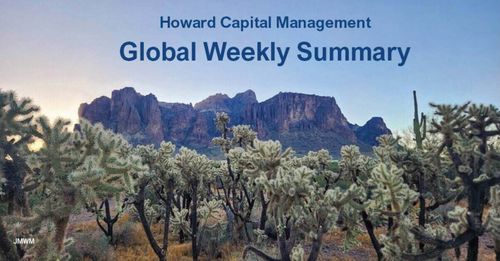
Howard Capital - Global Weekly Summary
Choppy markets as investors retreat to value
February 13, 2026
Choppy markets as investors retreat to value
Posted By: Editorial Team
Weekly Market Movers — Key Highlights
- Global equities were mixed, giving up early gains as investors rotated out of technology stocks.
- Dow hit record highs early in the week before tech‑driven weakness pulled major indices lower.
- Labor data was mixed—unemployment dipped to 4.3%, and job gains exceeded forecasts, while jobless claims remained elevated.
- Corporate earnings were varied, with strong revenue reports from Robinhood, AppLovin, Cisco, and Apollo, though market reactions differed based on margins and competitive pressures.
- Healthcare stocks outperformed, with Novocure and Novo Nordisk rising on regulatory approvals and shifts in industry dynamics.
Global equities were mixed this week, with the MSCI ACWI reversing early gains as investors rotated out of technology stocks. U.S. markets mirrored this trend, as tech‑led weakness pulled major indices lower despite the Dow briefly touching record highs. Economic data was mixed: unemployment edged down to 4.3%, and January job gains beat forecasts, while weekly jobless claims remained elevated and existing home sales fell sharply. Retail sales held steady, reflecting inflationary pressures and softer consumer sentiment. Corporate earnings were varied—Robinhood, AppLovin, Cisco, and Apollo reported strong revenue figures, though market reactions differed based on margins and competitive outlooks. In healthcare, Novocure and Novo Nordisk saw stock gains on regulatory approvals and industry shifts.
In global geopolitics, Prime Minister Sanae Takaichi’s party secured a sweeping victory in the snap election. President Volodymyr Zelenskyy conditionalized the possibility of holding elections on a ceasefire with Russia. President Trump continued to urge Iran to negotiate with the U.S., even as U.S. troop deployments to the Middle East continued.
Global Updates
- The MSCI All Country World Index initially rose and later declined over the week as investors pulled back from technology stocks.
- France’s economy is expected to grow 0.2%–0.3% in Q1, in line with the Bank of France’s 1% annual growth forecast, Governor Villeroy de Galhau said on Thursday.
- Welspun Living reported a decline in its quarterly profits as its margins were pressured by a slowdown in exports following U.S. tariffs.
- Siemens Energy has reported a net profit of approximately £746 million for the fiscal first quarter.
- Hermès reported stronger‑than‑expected fourth‑quarter revenue, driven by robust demand in the U.S. and Japan for its high‑end handbags.
- Thyssenkrupp has set aside $477 million to cover extensive job cuts in its steel unit, as it continues negotiations with India’s Jindal Steel International over a potential sale of the division.
- German submarine maker TKMS reported a record $22 billion order backlog and raised its 2026 sales outlook on Wednesday, driven by rising demand for warships amid growing geopolitical tensions.
- Mercedes‑Benz said that profit margins in its autos division may shrink further this year, reflecting pressure from high costs, a weak Chinese market, and global tariffs.
- TotalEnergies will cut its first‑quarter share buybacks by half but remains focused on expanding its oil and gas reserves, as weak energy prices offset strong refining profits and gains from selling stakes in renewable assets.
- The UAE central bank has joined Hong Kong’s Central Moneymarkets Unit (CMU) debt depository, giving Middle Eastern investors easier access to Chinese assets.
- Hindustan Unilever’s quarterly profit fell 15% on Thursday, hit by margin pressures and a one‑off cost from India’s new labour codes, sending its shares down over 4%.
- The UK has selected HSBC’s blockchain platform to run its pilot for tokenized government bonds, a move that positions Britain ahead of other G7 nations in testing blockchain‑based sovereign debt.
- Russian oil transit to Eastern Europe through the Ukrainian section of the Druzhba pipeline has been halted since January 27 following a Russian attack, Ukraine’s foreign ministry said on Thursday.
- Russia’s overnight drone and missile strikes severely damaged Ukraine’s energy system on Thursday, cutting heat, power, and water in several cities. In Odesa alone, around 300,000 people lost electricity and water, officials said.
- U.K. Defence Minister John Healey said that Britain has allocated $205 million to the Prioritised Ukraine Requirements List initiative to provide Ukraine with U.S. made weapons.
U.S. Equity
- U.S. equity markets rotated out of technology stocks over the week, leading to a significant decline in broad market indices. The blue-chip Dow Jones Industrial Average index touched record highs early in the week, after crossing the 50,000 mark on Friday last week. But the Dow declined later in the week, as fears of AI disruption led to a selloff in technology stocks.
- The U.S. Bureau of Labor Statistics reported a decline in the unemployment rate from 4.4% in December to 4.3% in January. The U.S. economy added 130,000 jobs in January, surpassing initial forecasts.
- Weekly jobless claims declined by 5,000 to 227,000 for the week ended February 7, which was higher than expected.
- Existing home sales were below expectations in January, declining by 8.4% to 3.91 million in January, from 4.35 million in December. The housing market was weighed down by inflated prices, low inventories, and cooling consumer confidence.
- Census Bureau data showed that U.S. retail sales were in line at 0.6% in December despite a strong start to the holiday shopping season, due to inflation, tariffs, and weather.
- Robinhood reported 27% growth in fourth quarter revenue to $1.28 billion and diluted EPS of $ 0.66. The brokerage platform’s Crypto revenue of $221 million and options revenue at $314 million were, however, below expectations. Robinhood CEO Vlad Tenev anticipates a ‘market supercycle’ in 2026, which could drive up volumes.
- AppLovin reported fourth-quarter EPS of $3.24 on a revenue of $1.66 billion driven by advertising and AI powered tools. However, the marketing platform’s stock price fell as the market anticipated increased competition.
- Apple stock declined this week after the Federal Trade Commission cautioned the company for misrepresenting its terms of service and unduly favoring left‑wing publishers.
- Cisco reported a larger-than-expected second quarter EPS of $0.80, on a 10% higher revenue of $15.3 billion due to AI-driven demand for its networking products. On the other hand, Cisco stock dragged as its adjusted gross margin declined to 67.5% and is projected to decline to 66.5% driven by higher memory costs.
- Apollo Global Management reported fourth quarter revenue of $9.86 billion and a record $300 billion originations, $225 billion inflows in 2025, which raised the company’s assets under management (AUM) to $938 billion
- Swiss pharmaceutical firm Novocure's stock rallied following the approval of its Optune Pax treatment for pancreatic cancer by the U.S. Food and Drug Administration.
- Novo Nordisk’s stock price rose this week after Hims & Hers Health announced a rollback of its plans to offer weight loss pills, under pressure from the FDA.
Fixed Income
- The Bloomberg U.S. Aggregate Bond Index edged up over the week. Bond yields rose this week as markets scaled back their expectations for fewer near‑term rate cuts, with the likelihood of a rate cut by the U.S. Fed in March at 94%.
- The U.S. 10-year Treasury yield declined to 4.113%, and the yield on the 2-year note edged lower to 3.472% over the week.
- The U.S. Dollar Index declined to 97.05 over the week, as global markets reacted to the electoral outcomes in Japan and Chinese regulators advising reduced exposure to U.S. treasuries.
HCM-030624-063.GWS
Wealth Watch: From the desk of Vance Howard
AI Fatigue is Real – And It Can Make You Money
Posted By: Vance Howard - February 17, 2026
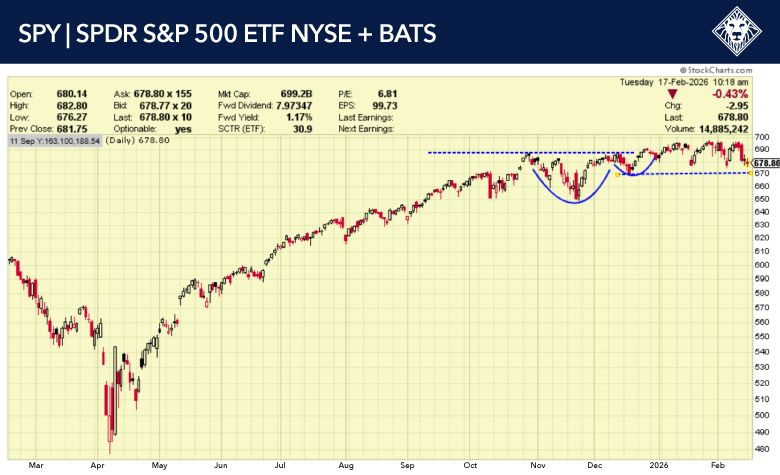
The market is having AI fatigue, and software companies, along with a lot of very profitable tech firms, have sold off in the last three weeks. After starting the year off strong, the market has now given back January gains and looks to be a bit sloppy. The markets should now be considered oversold, as identified by the VIX. There has been a nice rotation, and the consumer staples sector is holding up well. We think investors rotating their capital rather than just selling out is a good sign of a bull market. Will it rotate back into software and tech? The answer is “Of course.” Any time we have had a disruption such as the start of the internet, cloud storage, etc., the top 100 firms have always found a way to adapt and profit.
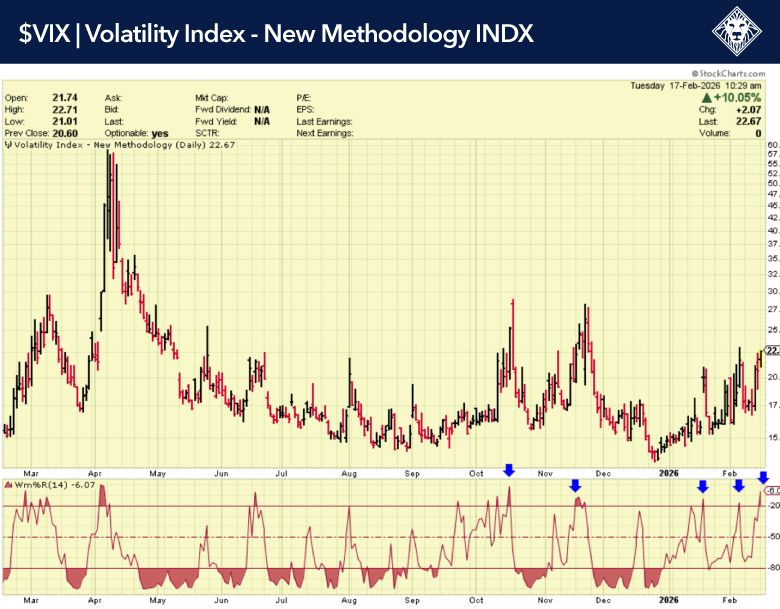
Microsoft (MSFT), one of the most profitable companies on the planet and one of the biggest constituents of all the major indices, has sold off and is down about 14% YTD. Not only do they have a mountain of cash, but they also have a mountain of intellectual capital, meaning very smart people working there. The companies that have sold off in the last three weeks are some of the most profitable companies around. Ask yourself, do you think the MAG seven is not already gaming AI for their profitability?
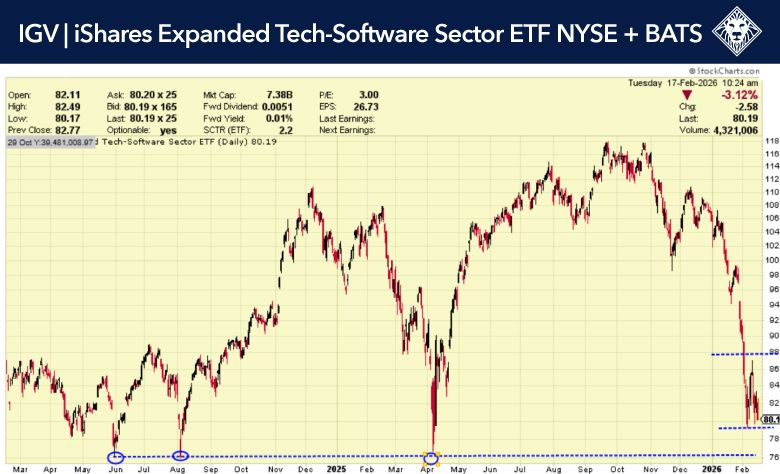
The volatility has created buying opportunities in companies like Microsoft (MSFT), Palantir (PLTR), and Applovin (APP), just to name a few. Also, if you want to play a large basket, the iShares Expanded Tech-Software ETF (IGV) has sold off and is very close to hitting very strong support.
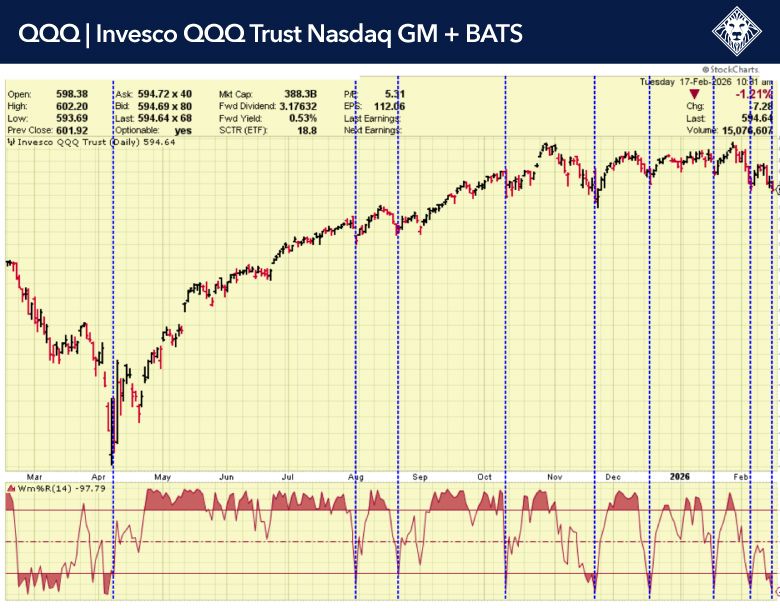
The market is still in an uptrend and is testing some areas of support, and in a trading range.
Like Warren Buffet always says, buy when others are selling. So, get your buy list out and start looking at some of the most valuable companies anywhere in the world, they are now on sale.
The HCM-BuyLine® Explained
Curious how the HCM-BuyLine® works—and whether it fits your investment strategy?
The HCM-BuyLine® is a proprietary, rules-based investment tool designed to help manage portfolio risk by using market momentum indicators. Instead of relying on emotional decision-making, the BuyLine® uses quantitative data to signal when to reduce equity exposure and when to re-enter the market. This can help protect capital during major downturns and participate in uptrends when conditions improve.
For investors seeking an alternative to traditional buy-and-hold strategies, the HCM-BuyLine® offers a more dynamic, tactical investment approach. Its methodology may be especially valuable during periods of volatility or economic uncertainty.
Have you seen this kind of strategy from your current financial advisor? Are you looking for an investment philosophy that adapts to changing market conditions?
At J. Martin Wealth, we believe in aligning your financial plan with tools that are built to adapt. The HCM-BuyLine® is one example of how data-driven investing can support long-term goals while managing downside risk.
Frequently Asked Questions
Q: What is the HCM-BuyLine and how does it work?
A: The HCM-BuyLine® is a systematic, rules-based investment indicator developed by Vance Howard at Howard Capital Management. It uses quantitative market data to signal when to reduce equity exposure during downturns and when to increase exposure during uptrends. Rather than relying on emotion or guesswork, the BuyLine® follows predetermined criteria to help manage portfolio risk. Think of it as a disciplined framework for deciding when to be more defensive (holding cash) or more aggressive (holding stocks) based on current market conditions. It's designed to help protect capital during major market declines while participating in growth when conditions improve.
Q: Is tactical investing right for retirees?
A: Tactical investing strategies can be suitable for certain retirees, particularly those concerned about sequence-of-risk—the danger of large losses early in retirement. For retirees who are drawing income from their portfolio, avoiding major market downturns can be especially valuable since you don't have decades to recover. However, tactical strategies are not right for everyone. They involve more active management than traditional buy-and-hold approaches, and past performance does not guarantee future results. The best fit depends on your individual risk tolerance, time horizon, income needs, and overall financial plan. We recommend discussing tactical strategies with a fiduciary advisor who can evaluate whether they align with your specific retirement goals.
Q: How is this different from what most financial advisors in Chandler or Gilbert offer?
A: Most traditional financial advisors in the East Valley use a buy-and-hold approach with periodic rebalancing—meaning your portfolio stays invested in stocks and bonds regardless of market conditions. The HCM-BuyLine® approach is tactical, meaning it attempts to reduce equity exposure during unfavorable market conditions and increase exposure when conditions improve. This doesn't make one approach "better" than the other—they serve different objectives. Buy-and-hold is simpler and works well over very long time horizons. Tactical strategies like HCM aim to reduce volatility and manage downside risk, which can be especially important for retirees who can't afford to wait years for a portfolio to recover. At J. Martin Wealth Management, we believe in matching the strategy to the client, not forcing every client into the same approach.
Q: Does the HCM-BuyLine® guarantee that I won't lose money in a downturn?
A: No. The HCM-BuyLine® is an investment tool designed to help manage risk, but it does not eliminate risk or guarantee results. All investing involves the potential for loss, including loss of principal. Tactical strategies attempt to reduce exposure during declines, but market conditions can change rapidly, and there may be delays in executing portfolio adjustments. Additionally, moving to cash during downturns means you might miss some recovery gains if the market rebounds quickly. There are trade-offs with any investment approach. The HCM-BuyLine® has been used since 1996, but past performance is not indicative of future results. It's a tool, not a guarantee, and should be evaluated as part of a comprehensive financial plan.
Q: Can I invest with Howard Capital Management directly, or do I need to work through J. Martin Wealth Management?
A: Howard Capital Management is an institutional investment manager based in Roswell, Georgia, and they primarily work with financial advisors rather than directly with individual investors. At J. Martin Wealth Management, we have access to Howard Capital Management strategies as one of several investment approaches we can incorporate into client portfolios. We serve as your fiduciary advisor, building a comprehensive financial plan tailored to your situation, and when appropriate, we may recommend tactical strategies like those offered by Howard Capital Management. Working with us means you get personalized advice, local service in Chandler and Gilbert, and a financial plan that goes beyond just investment management—including retirement income planning, Social Security optimization, tax strategy, and more.
Q: I'm retiring soon in Gilbert—should I be worried about this market volatility?
A: Market volatility in the years immediately before and after retirement is something to take seriously, but worry isn't productive—having a plan is. This period is when you're most vulnerable to sequence-of-returns risk, meaning poor market performance early in retirement can significantly impact your long-term financial security. If you're within 2-3 years of retirement and haven't stress-tested your plan against market downturns, now is the time to do so. Consider questions like: Is your asset allocation appropriate for your timeline? Do you have enough cash reserves to avoid selling stocks in a down market? Are you maximizing Social Security timing? Do you have a tax-efficient withdrawal strategy? These are the conversations we have every day with pre-retirees in Gilbert, Chandler, and across the East Valley. If you'd like a second opinion on your retirement readiness, we offer complimentary consultations to review your situation and discuss whether your current plan accounts for market risk.
Still Have Questions?
Market volatility and investment strategies can be complex. If you'd like to discuss how tactical investing or other risk management approaches might fit into your retirement plan, we're here to help.
Schedule a complimentary consultation with J. Martin Wealth Management:
Serving Chandler, Gilbert, Maricopa, and Gold Canyon.
Disclosure: This FAQ is for educational purposes only and does not constitute investment advice or a recommendation to buy or sell any security. The HCM-BuyLine® is a proprietary indicator and does not guarantee investment results. All investing involves risk, including potential loss of principal. Please consult with a qualified financial advisor to discuss your specific situation.
The HCM-BuyLine® is a proprietary indicator and does not guarantee investment results or prevent losses. All investing involves risk, including the potential loss of principal.
Ready to Learn More?
Schedule a complimentary consultation to explore how the HCM-BuyLine® and other tactical strategies may fit into your overall investment plan.

Who is Vance Howard?
Vance Howard embarked on his professional career in the financial industry in 1992, establishing Chartered Financial Services, Inc. He subsequently founded Howard Capital Management, Inc. in 1999, a fee-only Registered Investment Advisor. Mr. Howard brings expertise in the analysis, creation, and execution of diverse trading strategies.
Prior to his focus on financial services, Mr. Howard founded Delta Waste Services in 1988, a waste management company he later sold in 1992. Additionally, he co-published investment-focused newsletters, "The Savvy Investor" and the "SI Intermediate-term Trader", which garnered an international readership across over 25 countries between 1992-1999.
Demonstrating a commitment to community, Vance has served on the Huntsville, Texas city council for four terms, including two terms as mayor pro tem. His civic involvement extends to roles such as Huntsville's City Finance Chairman, Chairman of the Huntsville/Walker County 911 Emergency Service, and board positions on the Houston/Galveston Economic Development Council and the District 910 Legal Grievance Committee. He is a former President and active member of the Huntsville Rotary Club.
Outside of the professional sphere, Vance collaborates with family members in the operation of the Bar C Ranch in Madisonville, Texas, where they specialize in raising registered longhorn cattle. His leisure interests include travel with his wife and children, cycling, kayaking, scuba diving, and hiking.
“We aim to take emotion completely out of the equation. Trading with emotions, in our opinion, ruins long-term returns.”
— VANCE HOWARD, CEO + PORTFOLIO MANAGER
Disclosure:
Howard Capital Management, Inc issues this communication. It is for informational purposes and is not an official confirmation of terms. It is not guaranteed as to the accuracy, nor is it a complete statement of the financial products or markets referred to. Opinions expressed are subject to change without notice. Howard Capital Management, Inc. may maintain long or short positions in the financial instruments referred to and transact as principal or agent. Unless explicitly stated otherwise, this is not a recommendation, offer, or solicitation to buy or sell, and any prices or quotations contained herein are indicative only. To the extent permitted by law, Howard Capital Management, Inc. does not accept any liability arising from using this communication. Howard Capital Management is an SEC-registered investment advisor that only does business where it is properly registered or is otherwise exempt from registration. SEC registration does not constitute an endorsement of the firm by the Commission nor indicates that the advisor has attained a particular skill or ability. Past performance is no guarantee of future results.
This newsletter is a publication of Howard Capital Management, Inc. It should not be regarded as a complete analysis of the subjects discussed, nor should the newsletter be construed as personalized investment advice. All expressions of opinion reflect the author's judgment as of the publication date and are subject to change. It should not be viewed as legal or tax advice. Always consult an attorney or tax professional regarding your legal or tax situation. There can be no guarantee that the HCM-BuyLine® indicator will perform as anticipated. Stop-loss protection will not necessarily limit your losses to the desired amounts due to the limitations of the HCM-BuyLine®, market conditions, and delays in executing orders. It is not an actual stop-loss order that automatically sells securities in the portfolio at a certain price.
Past performance is not indicative of future results. The material above has been provided for informational purposes only and is not intended as legal or investment advice or a recommendation of any particular security or strategy. The investment strategy and themes discussed herein may be unsuitable for investors depending on their specific investment objectives and financial situation. Information obtained from third-party sources is believed to be reliable, though its accuracy is not guaranteed, and J. Martin Wealth Management makes no representation or warranty as to the accuracy or completeness of the information, which should not be used as the basis of any investment decision. Information contained on third-party websites that J. Martin Wealth Management may link to are not reviewed in their entirety for accuracy, and J. Martin Wealth Management assumes no liability for the information contained on these websites. Opinions expressed in this commentary reflect subjective judgments of the author based on conditions at the time of writing and are subject to change without notice. No part of this material may be reproduced in any form or referred to in any other publication without express written permission from J. Martin Wealth Management. For more information about J. Martin Wealth Management, including our Form ADV brochures, please visit https://adviserinfo.sec.gov or contact us at 480-630-6177.
